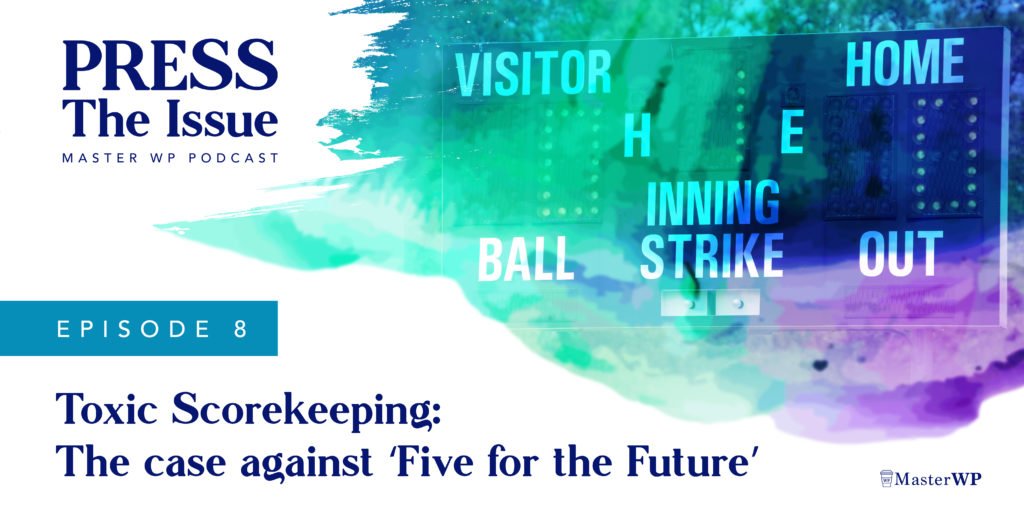In the WordPress world, giving back matters. We want to build great software — but just as importantly, we want to build a framework for the success of open-source software far beyond our favorite content management system.
Earlier this month, WordPress Executive Director Josepha Haden Chomphosy wrote about clarifying the structure of Five for the Future, the initiative that encourages companies to dedicate five percent of their time and resources toward improving the WordPress open-source software and community.
My colleague Allie Nimmons expanded on this in The Repository, noting that “When I visit my WordPress.org profile to look at how I can ‘claim’ my pledge to Five for the Future, I don’t see an option that fits what I do.”
Nimmons and Haden Chomphosy also talked on our podcast about how the pandemic has affected contributors. They agree that Five for the Future (5ftF) should be a positive experience, not a stressful one. Nimmons adds: “Haden Chomphosy shared with me her desire to avoid making people feel like their contributing time was being counted. No one will punish or admonish you if you aren’t exactly contributing 5% of your time.”
Unfortunately, WordPress co-founder Matt Mullenweg is indeed doling out punishment, and I think this behavior is calling the value of the whole 5ftF initiative into question.
When ‘give back’ becomes ‘not good enough’
In a series of now-deleted tweets, Mullenweg took GoDaddy to task for not contributing enough to 5ftF. This wasn’t his only criticism of GoDaddy — he also dislikes that they are building a competitor to WooCommerce Payments — but the idea that they are not doing enough was central to his argument.
GoDaddy responded in an interview with Sarah Gooding at WP Tavern, and that response also focused largely on calculating the size of their 5ftF contribution. The article includes several other examples of companies’ contributions:
“GoDaddy sponsors 34 contributors for a total of 217 hours per week across 15 teams. With 9,000 employees, this amounts to a relatively small number of hours compared to other hosting and product companies, like Automattic (4098 hrs/week) and Yoast (250 hrs/week). …
Bluehost (750 employees) sponsors 6 contributors for a total of 102 hours per week across 4 teams. … SiteGround (500 employees) sponsors 12 contributors for a total of 58 hours per week across 7 teams. … DreamHost (200 employees) sponsors 3 contributors for a total of 30 hours per week across 4 teams.”
While the conclusion about GoDaddy’s lower contribution relative to its number of employees is true based on this data, I’m not sure that’s as convincing or healthy of an argument as Mullenweg seems to think it is. In fact, his behavior seems to directly contradict the goals of his colleague, Haden Chomphosy, who says she doesn’t want people to feel like their time is being counted. (Mullenweg owns Automattic, and Haden Chomphosy is employed by Automattic.)
Let’s do some back-of-the-envelope math on the 5ftF numbers above. Assuming that all employees work 40 hours a week…
Automattic — 1,930 employees. 77,200 available hours per week (1930*40). 4,098 hours pledged to 5ftF. Contributing 5.3% of hours.
Yoast — 140 employees. 5,600 available hours. 250 hours pledged. Contributing 4.5% of hours.
Bluehost — 750 employees. 30,000 available hours. 102 hours pledged. Contributing 0.34% of hours.
GoDaddy — 9,000 employees. 360,000 available hours. 217 hours pledged. Contributing 0.006% of hours.
As I tediously multiplied and divided on my iPhone calculator, I couldn’t help but notice how frivolous and stressful it is to keep score all the time. I was struck by the fact that GoDaddy, in raw-number terms, contributes more hours than Bluehost, SiteGround and DreamHost combined, and about the same as Yoast. That could mean that GoDaddy, in practice, has a larger positive effect on WordPress than the other hosts even though its contribution relative to its number of employees is lower.
I understand that Mullenweg has reasonable gripes about GoDaddy competing with WooCommerce, but the contention that 217 hours a week is not enough seems unsubstantiated to me. The cash equivalent, assuming employees cost GoDaddy $50/hour, is about $500,000 per year. They also make large sponsorship purchases for WordCamps and similar events, which directly support the community and are not captured in the 5ftF data. (They are not a sponsor of MasterWP and do not pay me in any way, and in fact I believe they owe me hundreds of hours of my life back due to horrible tech support in the early 2000s.) Imagine if Warren Buffet donated half a million dollars to your cause, and you said he was “parasitic” because it wasn’t a large enough percentage of his net worth.
Consider the fact that Automattic — literally the WordPress company, which owns WordPress.com and WordPress VIP and WooCommerce and is controlled by Mullenweg, the co-founder of WordPress – barely logs more than 5% of its hours to 5ftF. I think this single-handedly demonstrates the futility of keeping score and shows that (as Allie Nimmons suggested) the definition of a 5ftF contribution is unreasonably narrow.
The height of the absurdity is that, with 18 employees, MasterWP can pledge just six hours a week and be contributing “more” relative to our size than both Bluehost and GoDaddy. At 40 hours a week, our 18-person team would be contributing more (percentage-wise) than Yoast and Automattic, even though they obviously make a much bigger contribution when you look at the numbers in a way that reflects real life.
If you’re like me, you are quickly realizing there are a bunch of reasons why these calculations and conclusions don’t make sense — which is exactly the point. This method of quantifying contribution does not make sense. It is open to all sorts of statistical spinning and interpretation. It is game-able. It fails to capture event sponsorships and many other important contributions. We should not use it as a basis for important decisions.
But beyond the statistical spin, there is a deeper reason why we need to get rid of the scoreboard.
[midroll_1]
Rewards are also punishments
For those of us raised on good grades and gold stars as a source of self-worth (myself included), this is a hard pill to swallow: you can’t reward people without simultaneously threatening to punish people by withholding or revoking that reward.
We reward people by publishing their pledged hours on WordPress.org — but in doing so, we inherently exclude and judge others. Some of those people may be choosing to not contribute because of corporate stinginess, but certainly, others simply don’t have the time or ability to do free work for WordPress or are doing work that doesn’t fit into the narrow confines of the 5ftF rules. Maybe they even tried to get involved but were discouraged by difficult onboarding or unwelcoming attitudes among existing contributors. By elevating the 5ftF scoreboard as a way to reward some and criticize others, Mullenweg punishes everyone who’s not living up to his arbitrary standards.
Most of us agree with statements like, “You are good enough just the way you are.” But the focus on measuring one’s worth via pledged hours and profile badges (which correlate with availability of time and money) results in some people being deemed “not enough,” even if it is rarely articulated as directly as in Mullenweg’s criticism of GoDaddy.
If you need proof that people feel judged and threatened by Five to the Future, look no further than the comments on Josepha Haden Chomphosy’s recent post about attempting to improve and clarify the program. You will find the owners and leaders of many multi-million-dollar companies fretting about every detail. The vibe is, Will I be recognized? If I am not recognized, what will become of me?!
I get it – when I read Mullenweg’s comments about GoDaddy, one of my gut reactions (after confusion and dismay) was considering whether these same stats might be weaponized against me or others in the future. I started calculating how many hours we’d need to hit 5 percent. But when it comes down to it, this shame- and guilt-based persuasion sets off alarm bells because it’s a characteristic of a toxic relationship, not a healthy community.
[midroll_2]
Unconditional cooperation: A better version of the future
I wrote several different conclusions to this article as I grappled with potential solutions for the problem of toxic scorekeeping in Five for the Future. The more I learned, though, the less I felt the program was salvageable.
The core failure of Five for the Future is that it creates internal competition when we should instead have internal cooperation. We have plenty of competitors – Squarespace, Wix, Shopify, and many other content management systems. We should not be creating more stress and competition within the contributor community. If WordPress and Automattic were really able to follow Josepha Haden Chomphosy’s example and treat the five-percent target as a fun aspiration without consequences, perhaps it would be valuable as a general guideline. But Matt Mullenweg and other major company leaders clearly watch the scoreboard, and there is a risk that if your contribution is “not enough,” it can be brandished against you.
It’s also simply a distraction from doing actual, useful work. How many hours were wasted on these 21 extensive comments debating the various different categories that might count toward a completely made-up and functionally meaningless scoreboard? This type of petty debate about who gets credit for what is below us. We have plenty of real challenges ahead – spending our limited time, money and energy on this (especially at the CEO and Executive Director level of multiple companies) seems like a vain indulgence rather than a serious community-building initiative.
I propose that we simply stop keeping score. Delete the pledge data, delete the badges. WordPress is worth our time and energy regardless of whether we are showered in praise. If someone wants to talk about their contributions publicly, go for it! But there is no place in a healthy community for petty arguments and statistical sleight of hand. If we are all truly in this to make open-source the future, we shouldn’t pollute that with gold stars, praise and punishment. We should build a community based on mutual benefit and unconditional cooperation rather than toxicity and fear.
This is the first post in my series, Funding the Future of WordPress. Read the second post: What is WordPress worth to you?



